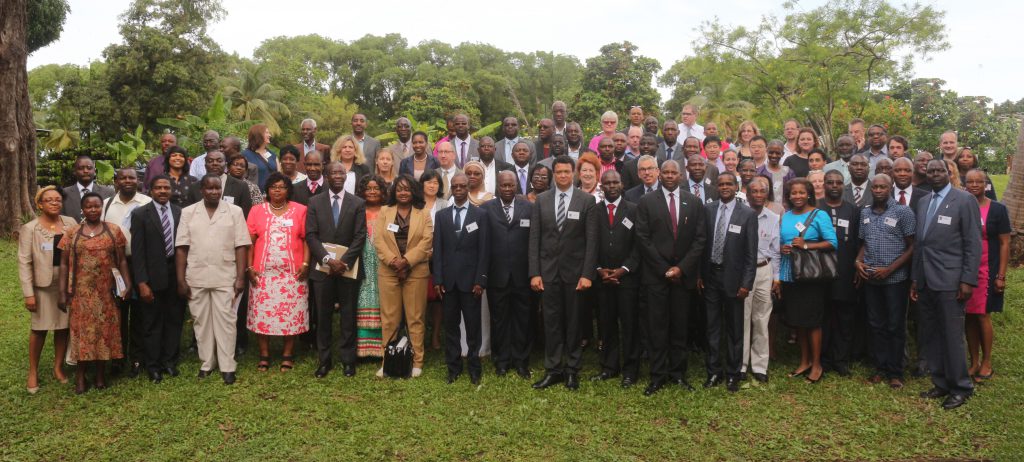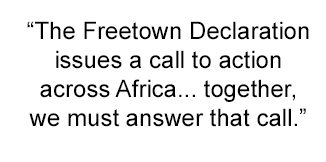Building Defences Against Future Ebola Outbreaks: Global Health Security in Africa
Building Defences Against Future Ebola Outbreaks
New Freetown Declaration advocates for increased prioritisation of functional tiered laboratory networks to close gaps in global health security agenda

PRESS RELEASE: Freetown, Sierra Leone (11 November 2015) – The recent Ebola outbreak in West Africa highlighted the importance of early disease detection and response in preventing the rise of new global health threats. Early detection requires that rapid disease testing capacity reaches across countries and into rural communities where people live. Now the health experts in Africa are taking steps to strengthen laboratory networks in order to improve the early detection of outbreaks on the continent.
During a ‘Regional Global Health Security Consultation for Laboratory Strengthening’ convened by the African Society for Laboratory Medicine (ASLM) and the World Health Organization’s Regional Office for Africa (WHO AFRO) in Freetown, Sierra Leone, on 15-16 October 2015, high-level Ministry of Health officials from more than 20 countries in Africa, together with ASLM and WHO AFRO, have issued a “Freetown Declaration” calling for a new framework for tiered laboratory networks and implementation of a score card to assess readiness of these networks. The Declaration calls for laboratory networks to be integrated with public health institutes and surveillance systems to ensure early disease detection in Africa. This new framework and integrated approach of laboratory networks and surveillance systems is critical to meet the needs of the Global Health Security Agenda (GHSA). GHSA is a collaborative effort from governments, international organisations, and civil society to promote global health security as an international priority.
“Diagnostic services are a cornerstone of health systems and, if well-integrated with surveillance systems, are essential for robust detection and response to public health threats. There has been enormous progress made in Africa to strengthen laboratory capacity to meet the needs of HIV, malaria, and tuberculosis programmes. It is now imperative for Africa to take the next steps and improve our resilience to emerging threats, especially to prevent a resurgence of Ebola,” says Sierra Leone’s Minister of Health and Sanitation, Dr. Abu Bakarr Fofanah. “Like Ebola, emerging diseases and new threats are still being identified on the front lines in our communities. The newly released Freetown Declaration calls upon national governments, donors, and local partners to address existing gaps in global health security in Africa.”
United States Coordinator for Threat Reduction Programs, Ambassador Bonnie Jenkins, says, “GHSA is intended to accelerate progress by the global community to build capacity to prevent, detect, and respond rapidly to infectious disease threats, in support of global frameworks that set the standard for durable protection against these threats to health and welfare everywhere. ASLM’s close collaboration with WHO AFRO to strengthen laboratory systems, as expressed in the Freetown Declaration, will provide a strong impetus for implementation of the GHSA in Africa.”
 “Given the growing role of laboratory networks in global health security and taking into account the International Health Regulations (IHR 2005) being implemented within the context of Integrated Disease Surveillance and Response (IDSR) in the African Region, the Freetown Declaration is a crucial opportunity to further strengthen and expand on public health laboratory networks,” affirms Dr. Matshidiso Rebecca Moeti, World Health Organization Regional Director for Africa. “The Declaration issues a call to action across Africa to establish resilient tiered laboratory networks, measure progress with a standardised score card, and integrate networks with public health institutes. Together, we must answer the call.”
“Given the growing role of laboratory networks in global health security and taking into account the International Health Regulations (IHR 2005) being implemented within the context of Integrated Disease Surveillance and Response (IDSR) in the African Region, the Freetown Declaration is a crucial opportunity to further strengthen and expand on public health laboratory networks,” affirms Dr. Matshidiso Rebecca Moeti, World Health Organization Regional Director for Africa. “The Declaration issues a call to action across Africa to establish resilient tiered laboratory networks, measure progress with a standardised score card, and integrate networks with public health institutes. Together, we must answer the call.”
Dr. Trevor Peter, Chair of the ASLM Board of Directors, says, “ASLM is working to tackle diagnostic and institutional weaknesses through a strategy that bolsters local capacity and builds strong partnerships across the continent towards the achievement of the GHSA targets. Countries need strong, functional tiered laboratory networks to ensure early disease detection and effective response. These networks need to be regularly assessed using a score card, as well as more effectively integrated into disease surveillance and public health institutes. No government or organisation can do it alone, so we must find ways to collaboratively build healthy communities now and for the long-term. The Freetown Declaration reasserts our commitment to strengthening local defences against future Ebola outbreaks.”
###
MEDIA CONTACT: Corey White, ASLM Senior Communications Officer, communication@aslm.org
- View the meeting summary report (PDF link) from the Regional Freetown Consultation.
- View the presentations from the Regional Freetown Consultation.
